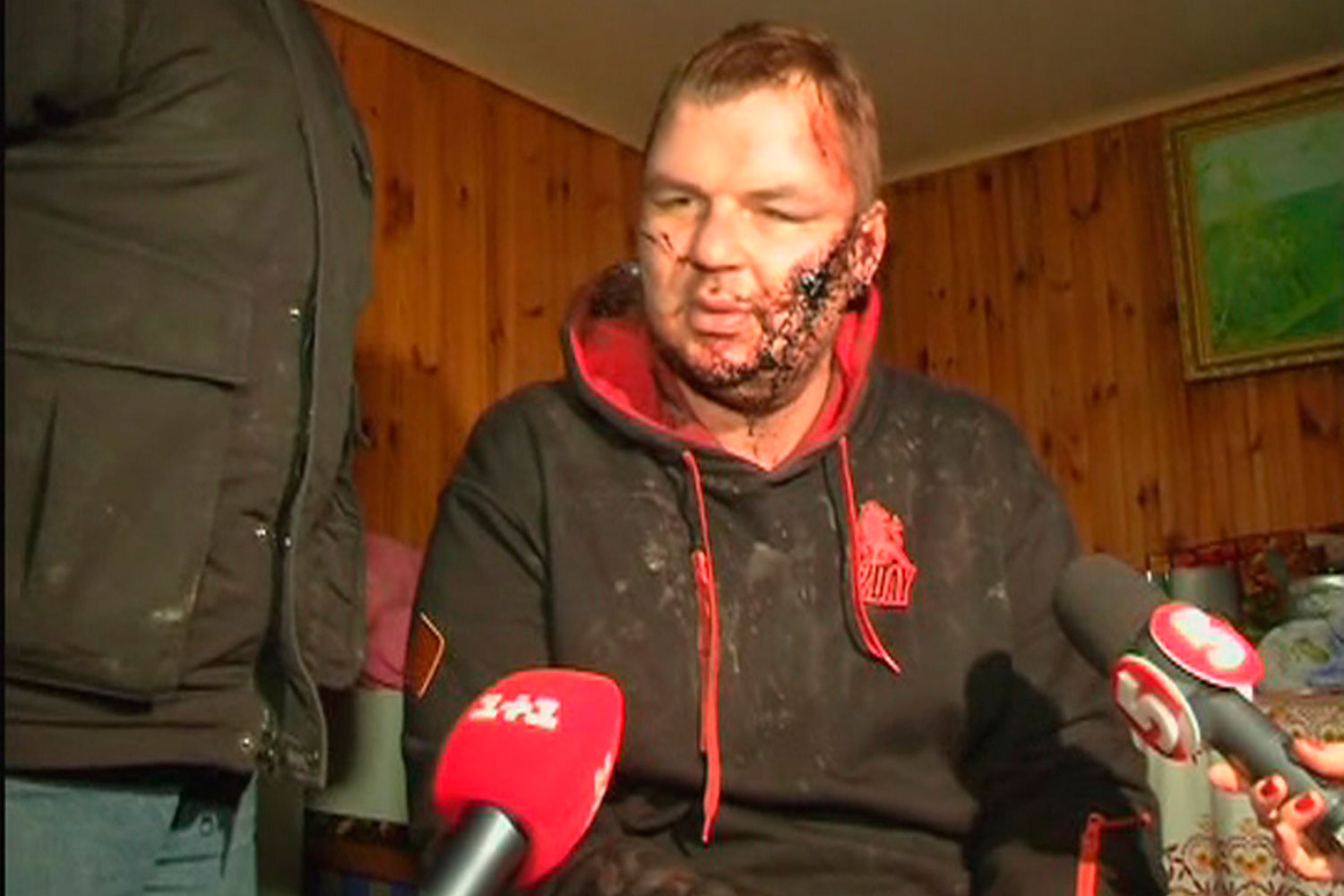
On Thursday night, Dmitri Bulatov, one of the activists who has been leading the revolution in Ukraine, came stumbling out of the darkness toward the lights of a village just south of the nation’s capital, Kiev. He had been missing for a week, since the night of Jan. 22, when his fellow activists believe he had been kidnapped by thugs loyal to the ruling government. When the villagers saw him on Thursday night, he was covered in blood. His left cheek had been slashed and his left ear partly severed. “They crucified me,” he told a local television crew that soon arrived on the scene. “So there are holes in my hands now,” he said, showing what looked like puncture wounds in both palms.
The gruesome images of Bulatov, 35, soon spread through the media and social networks, further infuriating the thousands of protesters who have occupied the center of Kiev since late November. Their fury has helped turn a peaceful protest movement into an insurrection over the past two weeks, as escalating violence against the demonstrators has given the revolution martyrs to rally around. Several protesters have been killed during clashes with police, at least one from apparent gunshot wounds, and their faces have now become symbols of the uprising, plastered around the massive tent camp that has paralyzed the center of the capital.
With the appearance of such martyrs, the stand-off in Kiev has grown increasingly intractable, while the pressure on President Viktor Yanukovych to resolve it keeps mounting from all sides. The value of Ukraine’s currency, the hryvnia, dropped to its lowest level in more than four years on Friday as the crisis continues to drain investor confidence in the economy. But a new amnesty law that Yanukovych signed on Friday morning did nothing to defuse the anger against him. Negotiations between the protest leaders and the government have all but broken down, as protest leaders now urge Yanukovych to answer for the violence himself and resign. Instead, the state has begun to signal that another crackdown is on the way.
On Friday morning, hours after Bulatov was found alive, the Ministry of Defense issued an appeal to the President “to take immediate measures to stabilize the situation in the country.” The statement raised fears among the opposition leaders that the President could impose martial law, calling the army to take back the government buildings that protesters have occupied across the country. But such violence would likely lead to more bloodshed – and more martyrs – to further fuel the uprising.
In recent weeks, its main slogan has already become, “Glory to Ukraine. Glory to the heroes,” a reference to the activists who have been killed or wounded amid the revolt. While he was missing, Bulatov’s became one of the revolution’s heroes, his name a rallying cry in the streets of Kiev. His alleged abduction took place in the days after the worst street battles between protesters and police on Jan. 19. Three days after those clashes, which saw protesters hurl rocks and Molotov cocktails at police, the body of one activist, Yury Verbystsky, 50, was found on a roadside near Kiev. Police found numerous wounds on his body and concluded that he had died of exposure after being left for dead in sub-zero temperatures.
A third activist, Igor Lutsenko, 34, has said he was kidnapped along with Verbytsky on Jan. 21 and badly beaten, but he had enough strength to limp to a nearby house and call for help. Lutsenko is now recovering in the same Kiev clinic where Bulatov was taken in the early hours of Friday morning. By evening, several cars of police offers arrived to arrest Bulatov, his fellow activist, Andrei Telizhenko, tells TIME from the hospital. “About eight cops came to serve him a warrant for his arrest,” he says. “But he lost consciousness and was taken to the reanimation ward. Now the cops are just standing around and waiting.” It is so far unclear, Telizhenko says, what the charges against Bulatov could be.
Speaking to reporters on Thursday night, Bulatov could not say who had kidnapped him. He remembers being clubbed in the head on a Kiev street and shoved into a waiting car, after which he was blindfolded by his captors, who “spoke with Russian accents,” he said. Although that claim sheds little light on their identity – about a third of Ukrainians speak Russian as their native language – it will likely fuel rumors that Russia has sent help to keep President Yanukovych in power.
Those rumors have not been substantiated in the least, and Russian officials have denied them. But notions of Russian involvement in the crackdown have become central to the dogmas of the revolutionaries, who condemn Yanukovych for steering Ukraine away from Europe into a closer alliance with Moscow. But such complaints over the President’s foreign policy have faded in recent days. The protesters now demand revenge for their dead or wounded comrades.
More Must-Reads From TIME
- The 100 Most Influential People of 2024
- Coco Gauff Is Playing for Herself Now
- Scenes From Pro-Palestinian Encampments Across U.S. Universities
- 6 Compliments That Land Every Time
- If You're Dating Right Now , You're Brave: Column
- The AI That Could Heal a Divided Internet
- Fallout Is a Brilliant Model for the Future of Video Game Adaptations
- Want Weekly Recs on What to Watch, Read, and More? Sign Up for Worth Your Time
Contact us at letters@time.com